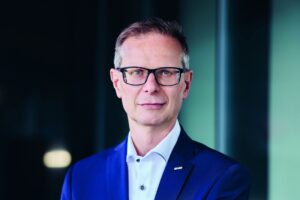by Anna Heck

Nils: I am Nils, the current President of VSETH, and I will be talking to Günther [Dissertori] today. He is the new Rector at ETH since last February. Quick first question: You come from South Tyrol, why did you decide to move to Switzerland and to work at ETH?
Günther Dissertori: I studied physics in Innsbruck in Austria and then I got the possibility to carry out my PhD at CERN in Geneva at the big accelerator and that was the trigger to move to Switzerland. I did not think for a second to not accept this offer. This was in 1994, since then I have not left Switzerland. After my PhD and a few years of research and work at CERN, I got an offer as assistant professor at ETH, and I never regretted to have chosen this path.
N: I imagine your first weeks as Rector of ETH have been overwhelming. Do you still have free time? What do you do in your free time?
G: The immediate answer is that I am working in my free time. The first weeks have been quite intense. Still, I try to find a little bit of free time. I try to spend time with my family. I have a wife and an 8-year-old daughter. They of course appreciate it that I am there for them. If possible, I like skiing. From time to time I like to go into my basement where I can do some soldering, coding and things like this, what a physicist likes to do.
N: Before becoming Rector, you were a pro- fessor for physics at ETH. You have a resarch group. How are you planning on pursuing work in research now you are Rector at ETH?
G: Well, this was of course an important question when the discussion about becoming Rector started. For me it was clear my research group must continue. First, because I like research a lot and my research group. Second, it would have been unfair to my group to say I stop, this is your problem now. I have several research projects going on that I could not drop. I am in the fantastic situation that I have great people in my group, senior people that I trust blindly. I am very confident they will manage, even when my pre- sence is much reduced. At the same time, this is a bit of an experiment.I will see how it goes for example during the first year. If things develop well then, then I will continue as is, and if things suffer, I might have to adapt a little bit. For now, things are going fine.
N: As Rector, you are elected for life, at least until you retire. Are you planning on being Rector until retirement, or do you want to go back to research sometime earlier?
G: My retirement is too far away, it is in 13 years. I would say 13 years is too much. I really do not know how long I will do this. A reasonable time frame is between five and eight years. You need a few years to realise some things. There are many things you cannot do in one or two years, and you should also not stay too long. At some stage it is good that there are new ideas. It is good for the office, it is not the person that counts.
N: Students at ETH have been complaining for years now: they do not have enough vacation and that the vacations are too late. What do you want to do about that as a Rector?
G: The issue of the academic calendar is one close to my heart and I am serious to tackle it. I am realistic it will take time, but I am top motivated to act. We will start with a working group involving relevant stakeholders, including students. It could be a low hanging fruit to implement a lecture free week in the fall semester which is 14 weeks. This is tiring for you students and for the lecturers. The other issue of the academic calendar is: when does it make sense to have the examination block? In August and the period before, there is not much time left between the exam session and start of semester. It is worse in the winter because the exam session stops, and the semester starts right after. The problem is we are not alone. If we were the only people in this universe, we could implement it easily.
N: Can you give us a very vague timeline when it is realistic the change will come?
G: It is very difficult to say. I want to launch a working group soon. There could be the approach that we do different things consecutively. First, we go with a lecture free week in fall. This could be introduced in maybe one or two years. Or we reshuffle the entire calendar. This could take several years.
N: ETH has been growing this past decade. The number of students has been rising faster than faculty and space. The workspaces and spaces in the auditoriums are scarce. How do you plan on tackling these problems?
G: This is from my and the institution’s side the biggest issue we are facing. It affects many things. The lecture halls are too small, and people sit on the stairs, which is not good. Study places in the various buildings are rare. Also, the request for counselling has risen, and we only have a certain number of people. It is difficult to find student housing in Zurich, which can be a competitiveness problem. Students who come here to study but then do not find housing, they might go elsewhere. Today [15.3.2022] we had a meeting of all the people in the Rectorate. We decided on setting up a task force. This will start now, and we will contact VSETH soon because we want you involved. I will present the plan to the ETH council next week and then we will launch it.
N: Does this for instance mean the Basis- prüfung will become harder?
G: No, this is not in my intention. I think our Basis- prüfung has the right level. We should keep in mind we need experts that we educate. If we would make the Basisprüfung arbitrarily hard, then we would not respond to the need for experts of society. The aim of the Basisprüfung is that we set a certain quality and we should make sure those who have the skills to finish a complete ETH study program should also pass it. We have a good quality of the Basisprüfung which we should keep and not lower.
N: We have heard a lot about the ongoing pandemic, it seems the measures now are relaxed. I think it has been damaging to the mental health of the students. What are the ways the Rectorate wants to address those mental health problems of the students?
G: Like for my predecessor, the health of our students is very close to my heart. Which means putting in place all the conditions so that we can come on campus and we can have a teaching situation like in the past as much as possible. We do everything we can within a reasonable context. I think it has been right to stick to the masks in the beginning of February and March because the numbers are rising again. Be assured I care and always let me know when you think I should be aware of issues.
N: A big problem emerging is that Switzerland is not associated with the Erasmus and the Horizon program anymore. As Rector, how do you want to address these programs ETH is missing out on?
G: First, we must continue to make sure ETH manages to attract the best people, both at the professors’ level and the students. A way to attract the good students is to show we have a high- quality teaching. We must show people ETH is still offering a top-notch environment with academic freedom, fantastic infrastructure and students. Our students are the biggest asset of ETH. How- ever, we watch how the political situation develops.
N: A couple of years ago, ETH decided on increasing tuition fees of about 250 CHF. We students were strongly against this. ETH is facing budget restrictions and has to save money; is there a risk the tuition fees will rise again?
G: I am not aware of any such discussion right now. In that sense I would be relaxed. It has to be said: it is not ETH Zurich as a university that decides on the tuition fees. The ETH council effectively decides on these things.
N: To wrap it up is there anything you would like to tell the students?
G: I have been teaching for 20 years at ETH, I have always loved it. I have been director of studies and when I say the students are fantastic, I really mean it. Continue to be critical thinkers, continue to bring up your topics in an open and respectful discourse. Be part of the community. This is very enriching for everybody. Help us to fulfil our mission to provide you with a skill set with which you are then going to solve the problems of the future. More concrete only a few days ago I heard apparently in many courses the number of students in presence is not high. Maybe you have good reasons to not return on campus, but I would express: Please whenever possible come back and enjoy the lectures in person. Since we try to put everything into place that this is possible again, please try to use it. I understand Corona is not over yet. We will watch it, how this is evolving. Main message: Enjoy your stay at ETH and all the best for your studies, whatever you are studying.
